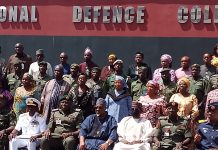The Speaker of the House of Representatives Rep. Femi Gbajabiamila has said that the current security challenges in Nigeria is a threat to the foundations of the country’s nationhood.
The Speaker, however, noted that the Nigerian Government has responded to the challenges by taking certain measures such as increasing funding for the police and the military, recruiting personnel for security agencies, among others.
Gbajabiamila spoke when he delivered a paper titled ‘Democracy in Challenging Times: The Role of African Parliaments in Safeguarding and Delivering on the Dividends of Democracy’ at the School of Oriental Studies, London on Wednesday as part of his ongoing official visit to the UK.
Speaking on the challenges facing Nigeria, Gbajabiamila said: “The most pressing of these challenges today is the national security crisis that threatens the foundations of our nationhood and portends great danger for Africa and the world if it persists.
The Speaker, however, said: “First, to address present challenges and then to build resilient institutions that can withstand uncertainty in troubled times, more than anything else, our focus must remain on the young and vibrant youth of Nigeria and Africa who have so much to offer the world and who have proven that they can thrive under challenging circumstances given half a chance.
“However we cannot do this for as long as our present national security challenges persist.
“The government of the Federal Republic of Nigeria has responded to the reality of our present challenges by increasing funding provisions for the police and armed forces, accelerating recruitment and training to put more boots on the ground and also acquiring weapons systems designed to give the security agencies an advantage.
The Speaker said upon the resumption of the 9th House, “the scope of our challenges was evident, matched only by our confidence that we would do what was required to overcome those difficulties and deliver the dividends of democracy for our people.
“Now the topic of this paper speaks to ‘dividends of democracy,’ a term that has been loosely and broadly interpreted to mean different things to different people but what exactly does it mean or what is a universally aceptable definition of the phrase dividends of democracy.
“For me and the House, we understood that the best dividend of democracy is a just society, where individual rights are recognised and respected. Where citizens have the freedom to dream big dreams and the social resources and infrastructure to achieve those dreams.
He noted that such moments create opportunities “for positive change, for righting wrongs and establishing new protocols better suited to the reality of the times than whatever existed before.
Motivated by these understandings, the Speaker added, for the first time in the history of the Nigerian legislature, the 9th House began by developing a legislative agenda to articulate in detail “our governing priorities and the specific actions we intended to meet those priorities.”
He said as the House was moving quickly to implement its agenda, the Covid-19 pandemic hit the world, forcing certain drastic measures, including a reworking of the Legislative Agenda.
“We proposed landmark legislation to reform our public health emergency response system and update our public vaccination protocols. We received heavy criticism for these efforts, as a spirited disinformation campaign suggested malicious intent behind our actions.
“Barely a year later, the rest of the world caught up to the problems we foresaw and sought to prevent and have gone on to enact the same vaccine mandates for which we were then roundly criticised.
“In addition to refocusing our local priorities, Covid-19 reminded us in parliament of the indispensability of international collaboration in seeking solutions to shared problems. It is an unfortunate reality that despite the similarities of our governance challenges across the continent, there often aren’t enough coordinated efforts to share ideas, jointly consider solutions and adopt best practices to address our shared problems.”
Gbajabiamila said with the support of his other colleagues across the African continent, “I convened the first Conference of Speakers of African Parliaments (CoSAP) as a platform for continental parliamentary cooperation and coordination that will allow us to try to change this dynamic.
“Already, the conference is participating in a broad partnership to renegotiate the terms of our national debts and free up much-needed resources for development whilst committing to a new regime of responsible administration of public resources.
He said the Nigerian House of Representatives would this year host the inaugural in-person meeting of CoSAP to establish a framework of action to ensure the achievement of the objectives that motivated this unique partnership.
“As in most of Africa, Parliament in Nigeria is designed on the basic premise that the legislative function is entirely to make laws and perform periodic oversight to ensure that the Executive implements the laws. This is an outdated model that fails to reflect the public expectation of parliament or the value that parliament and parliamentarians can bring to governance in a differently designed system.”













